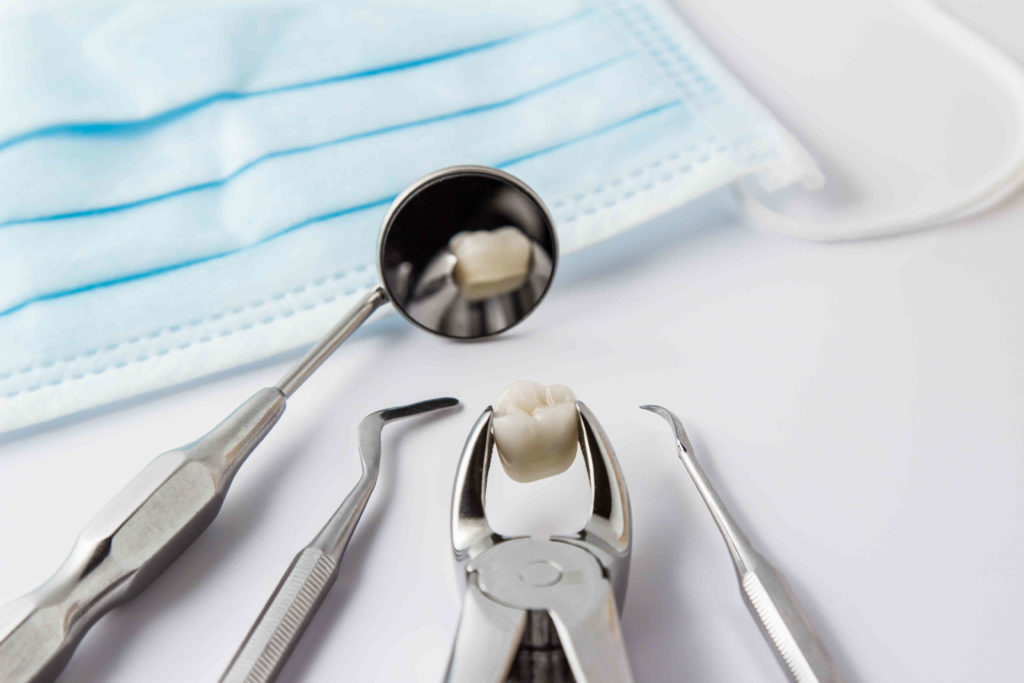Should wisdom teeth be extracted? If so, at what age and why? We inherited our wisdom teeth from our ancestors the great apes. In the past, they were used to chew uncooked meat and vegetables for a long time. Over the course of evolution, humans have increased the size of their brains and reduced the size of their jaws. Today, in most people, these teeth do not have enough space to grow properly. This can lead to a number of problems.
At what age do wisdom teeth start to grow in?
In theory, these are the last teeth to erupt, at around age 18. However, early eruption of wisdom teeth can occur around age 15. In other patients, they erupt late, at around 40, 50 or 60, or never at all. As long as the tooth has enough room to grow, there are few symptoms. Slight redness may appear, which will disappear with good hygiene. Under normal circumstances, the tooth should be fully grown in within 2 to 3 months. Dentists in Fribourg, Lausanne and Aigle recommend brushing the gums very well during wisdom tooth eruption. This helps to keep the area clean.
Is it absolutely necessary to extract wisdom teeth?
These teeth need to be removed when the dentist deems it necessary: either because there's not enough space for them to erupt fully, or to prevent problems in the future. How do you know if you need have your wisdom teeth extracted ? It's best to see your dentist around the age of 18 for a proper diagnosis. A panoramic X-ray will show the exact position of your teeth.
When can you keep your wisdom teeth?
The oral health care professional should assess the risks carefully before deciding to keep wisdom teeth. It's even possible that they'll never cause any trouble. If they are fully erupted and useful for chewing, there is no reason to remove them. They also need to be accessible so you can clean them efficiently. However, fewer than one in 10 patients meet these criteria. What's more, the disadvantages of late surgery generally outweigh those of tooth extraction between the ages of 18 and 25.
At what age should wisdom teeth be extracted?
Once the decision has been made, there is an optimal time to extract these wisdom teeth. The best age to minimize the risks of surgery is between 18 and 20. The roots of wisdom teeth are short and half-formed. The bone surrounding the wisdom tooth is softer, and a large capsule of soft tissue surrounds it. All these factors contribute to the ease of surgery and healing. Rest assured, a dental surgeon can perform tooth extraction without any problem up to the age of 25. After that age, it's best to consult a maxillo-facial specialist who will be able to resolve the problem.
What are the risks of not having wisdom teeth extracted?
- In the case of a fully impacted wisdom tooth: risk of cyst formation, root resorption of the neighboring molar and subsequent eruption.
- If the tooth is semi-included: risk of bacterial infection of the gingiva or bone, loosening of the penultimate molar, and of tooth decay under the gum.
- When the tooth is out, but in the wrong position: risk of tooth decay due to difficulty in cleaning it properly, risk of ulcers if it pushes towards the cheek, risk of supraeruption (when the tooth is not in occlusion with another tooth, it continues to grow).
Can not extracting wisdom teeth damage other teeth?
Unfortunately, yes, and this can lead to a number of recurring problems.
- The first problem is root resorption. This occurs when the wisdom tooth is fully impacted and pressed against its neighbor. The sac surrounding the wisdom tooth is made up of cells that perforate the bone to help the tooth erupt. Sometimes, these cells attack the root of the neighboring tooth, resorbing it.
- Second problem: the wisdom tooth is half-included and tilts towards its neighbor. This resorbs the bone behind the penultimate molar and mobilizes it. In this case, the patient suffers from sensitivity to hot and cold when chewing.
- Third problem: the formation of a cavity on the penultimate molar, caused by the inability to clean this area properly.
At Helvident, our dentists are qualified to extract wisdom teeth in children and adults. Don't hesitate to Contact us to book an appointment at one of our dental clinics in Fribourg, Lausanne and Aigle.

